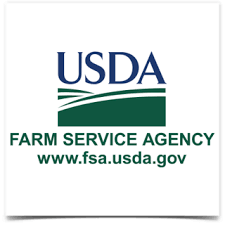
WASHINGTON, D.C. (Ag News 890) – The U.S. Department of Agriculture (USDA) Farm Service Agency (FSA) announced that signup has reopened for the Coronavirus Food Assistance Program 2 (CFAP 2) as part of the Pandemic Assistance for Producers initiative.
The initial CFAP 2 signup ended on Dec. 11, 2020, but USDA has reopened sign-up for CFAP 2 for at least 60 days beginning April 5, 2021, for producers to apply or make modifications to existing CFAP 2 applications.
CFAP 2 provides direct financial relief to producers due to market disruptions and associated costs because of COVID-19. CFAP 2 payments will be made for three categories of commodities – Price Trigger Commodities, Flat-rate Crops and Sales Commodities. Visit farmers.gov/cfap/commodities for a full list of eligible commodities for each category.
Price Trigger Commodities Price trigger commodities are major commodities that meet a minimum 5-percent price decline over a specified period of time. Eligible price trigger crops include barley, corn, sorghum, soybeans, sunflowers, upland cotton, and all classes of wheat. Payments will be based on 2020 planted acres of the crop, excluding prevented planting and experimental acres.
For broilers and eggs, payments will be based on 75 percent of the producers’ 2019 production.
Dairy (cow’s milk) payments will be based on actual milk production from April 1 to Aug. 31, 2020. The milk production for Sept. 1, 2020, to Dec. 31, 2020, will be estimated by FSA.
Eligible beef cattle, hogs and pigs, and lambs and sheep payments will be based on the maximum owned inventory of eligible livestock, excluding breeding stock, on a date selected by the producer, between April 16, 2020, and Aug. 31, 2020.
Flat-rate Crops Crops that either do not meet the 5-percent price decline trigger or do not have data available to calculate a price change will have payments calculated based on eligible 2020 acres multiplied by $15 per acre. These crops include alfalfa, extra long staple (ELS) cotton, oats, peanuts, rice, hemp, millet, mustard, safflower, sesame, triticale, rapeseed, and several others.
Sales Commodities Sales commodities include specialty crops; aquaculture; nursery crops and floriculture; other commodities not included in the price trigger and flat-rate categories, turfgrass sod; pullets; goat milk; mink (including pelts); mohair; wool; and other livestock (excluding breeding stock), not included under the price trigger category that were grown for food, fiber, fur, or feathers. Payment calculations will use a sales-based approach, where producers are paid based on five payment gradations associated with their 2019 sales, and crop insurance indemnities, Noninsured Crop Disaster Assistance Program (NAP), and Wildfire and Hurricane Indemnity Program Plus (WHIP+) payments for crop year 2019.
Applying for CFAP 2
Visit farmers.gov/cfap for details on all eligible commodities, producer eligibility, payment limitations and structure and additional program resources.
Producers have multiple options to apply for CFAP 2, including through an online application portal and by working directly with the FSA office. Customers seeking one-on-one support with the CFAP 2 application process can call 877-508-8364 to speak directly with a USDA employee ready to offer assistance.
Additional CFAP Payments for Beef and Row-Crop Producers
The Consolidated Appropriations Act, 2021, authorizes an increase in CFAP 1 payment rates for cattle. Cattle producers with approved CFAP 1 applications will automatically receive these payments and do not need to submit a new application since payments are based on previously approved CFAP 1 applications. Producers may be asked for additional information depending on how they filed the original application. Information on the additional payment rates for cattle can be found on farmers.gov/cfap.
This act also authorized additional CFAP assistance of $20 per acre for producers of eligible CFAP 2 flat-rate or price trigger commodities. FSA will automatically issue payments to eligible producers based on the eligible acres included on their CFAP 2 applications. Eligible producers do not need to submit a new CFAP 2 application.
Additional CFAP Actions FSA has also begun payment processing applications filed as part of the CFAP Additional Assistance program in the following categories:
- Applications filed for pullets and turfgrass sod;
- A formula correction for row-crop producer applications to allow producers with a non-Actual Production History (APH) insurance policy to use 100% of the 2019 Agriculture Risk Coverage-County Option (ARC-CO) benchmark yield in the calculation; and
- Sales commodity applications revised to include insurance indemnities, Noninsured Crop Disaster Assistance Program payments, and Wildfire and Hurricane Indemnity Program Plus payments.
Additional payments for swine producers and contract growers under CFAP Additional Assistance remain on hold and are likely to require modifications to the regulation as part of the broader evaluation and future assistance; however, FSA will continue to accept applications from interested producers.
Service Center staff continue to work with agricultural producers via phone, email, and other digital tools. Because of the pandemic, some USDA Service Centers are open to limited visitors. Contact your Service Center to set up an in-person or phone appointment. Additionally, more information related to USDA’s response and relief for producers can be found at farmers.gov/coronavirus.
